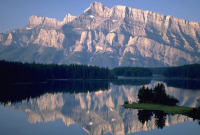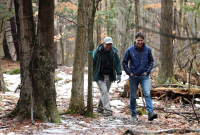Support strong Canadian climate journalism for 2025
Parks Canada says it has reached an agreement to acquire a privately owned parcel of land in Ontario's Georgian Bay area to expand the Bruce Peninsula National Park.
The 1,324-hectare property called Driftwood Cove includes 6.5 kilometres of uninterrupted shoreline and is home to at least 10 federally listed species at risk and dozens of ecologically, geologically and culturally significant cave systems, the agency said.
"This is an example of our commitment to making sure that we do right by the environment," federal Environment Minister Catherine McKenna told a news conference in Toronto. "Canadians value our land, we value our animals and we need to take action."
The funds for the purchase of the cove are coming from the 2018 federal budget, which included $1.3 billion to protect nature, parks, and wild spaces, McKenna said Wednesday. Canada has international commitments to conserve at least 17 per cent of its land and freshwater by 2020. So far, only 10.5 per cent is protected.
The property was publicly listed for $20.6 million, but Park Canada said the final purchase price will not be made public until the transaction is complete.
McKenna said the Bruce Trail Conservancy also made a significant financial contribution towards the purchase as a portion of the famous Bruce Trail runs through the property.
Parks Canada said the acquired land forms a significant part of the UNESCO Niagara Escarpment Biosphere Reserve. Since the establishment of the national park in 1987, Parks Canada has added 140 areas of land to it.
The minister said the addition of the Driftwood Cove property to the national park is a reason for Canadians to connect with nature.
"We want you to get out in our national parks, connect with our national parks, because we know then that you will protect them," she said, adding that the land needs to be kept pristine for future generations.
The number of people visiting Bruce Peninsula National Park has doubled in the last decade, rising to more than 400,000 last year, McKenna said. According to Parks Canada statistics, park attendance across the country is up 20 per cent in the 2017-18 period, compared to 2016-17.
More than six million Canadians visited national parks in 2017-18. All parks were free to attend last year for Canada's 150th birthday celebrations. At the end of last year, the federal government announced that all parks would be free to those 17 and under and for new Canadian citizens who qualify.
Beth Gilhespy of the Bruce Trail Conservancy called the area a "national treasure" and said the cove holds deep a ecological importance to the Bruce Trail.
"It's an absolutely stunning property," Gilhespy said in an interview. "I'm so pleased it's in Parks Canada's care."
The property contains an 8-km section of the Bruce Tail, said Gilhespy, who is the chief executive officer for the non-profit organization.
The area's at-risk species, including the Massasauga rattlesnake and the American black bear, are important, she said. Having visitors come to interact with the property will cause them to care about it more, she added.
The property is located in the traditional territory of the Saugeen Ojibway Nation. Head Councillor Mipkoon, an Indigenous man from that nation, attended to provide his support for the conservation efforts. He works with species that are at risk as well, he said in an interview.
"I'm for any government that wants to protect the climate," he said.
"Nature's the only one that can give us the peace that we need ... it's just that we've walked away from it," he said, adding that the land needs to be preserved, otherwise it won't be available to future generations.





Comments
This move on the part of the Trudeau Government almost - but definitely not quite - soothes my total anger and disappointment in respect of the Kinder Morgan project. I may not live long enough to witness the financial and ecological repercussions of that decision in spite of campaign assurances to the contrary. But congratulations for this gesture.
Exciting news!